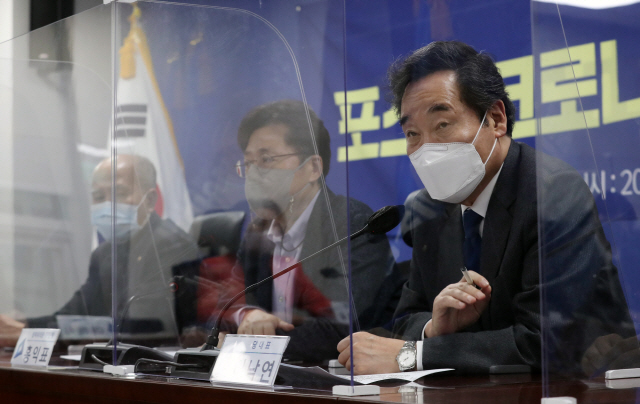■Nak-Yeon Lee’Profit Sharing My Way’
The party government shouted’form consensus first’
Company imprisonment due to ESG disclosure obligation
The ruling party also criticized “the risk of control donation”
Strong “anti-market” dissatisfaction in management
 viewer
viewer
“I think the introduction of the corona benefit-sharing system should be done voluntarily. It is advisable that discussions take place after a public consensus is formed first, as it may be another cause of conflict.” (Prime Minister Jeong Sye-gyun)
“As a rule, I would like to promote it with the voluntary participation of the private sector. (Profit sharing) I think that it is appropriate to let the private voluntary choice rather than force the goal setting or profit sharing method.” (Lee Nak-yeon, Representative of the Democratic Party)
Despite the recent remarks of President Lee and Prime Minister Jung, who represent the Party’s political party, the democratic party’s profit-sharing system is actually unfolding in the form of a’corporate arm twist’. On this day, a new topic from the Democratic Party was’employing early disclosure of corporate environment, society, and governance (ESG). Sighs poured out from the business world, which had put an expectation on the Party’s repeated policy of’voluntary participation’. An official in the business community pointed out, “The word that the ESG disclosure will be used for the implementation of the profit-sharing system is the same as saying that we will induce’deterring participation’ through the so-called’disgrace cycle’.” In addition, the Democratic Party is expected to intensify the pressure to implement the profit-sharing system in the near future, targeting platform operators such as Kakao Pay and Baedal People, large corporations such as Samsung and LG, and credit card companies.
◇ Aiming at the platform industry, such as Bae Min, at the first meeting of the Post Corona Inequality Relief Task Force (TF) held at the National Assembly on the 15th, Lee announced a policy to use ESG information to implement the profit-sharing system. Democratic Party Policy Committee Chairman Hong Ik-pyo, who served as the head of the TF, gave a briefing immediately after the meeting. There are many examples of voluntarily sharing profits with suppliers.”
In addition, it is expected that the reduction of fees for the people of delivery and Kakao Pay will be the main method of the profit sharing system. Earlier on the 13th, CEO Lee said, “I hope to develop a win-win cooperation suitable for the platform economy.” “If the platform company and the self-employed increase their profits through joint efforts, the self-employed’s margin rate is increased or the fee is reduced. I will be able to share it.” At the closed meeting on that day, it was reported that even the credit card companies that benefited from the disaster subsidies should share the profits.
◇野 Strong repulsion… Someone’s concerns = The Democratic Party is also planning to promote legislation at the extraordinary National Assembly in February, such as the introduction of the’Cooperative Benefit Sharing System’, which was also the presidential election pledge of President Moon Jae-in. Profit sharing through incentives such as taxation is expected to be key.
The power of the people is clearly opposing the benefit-sharing system promoted by the Democratic Party. Ho-young Joo, head of the People’s Power, said, “We will take back profits by twisting the arms of the economic agents.” He criticized, “The job should be made by companies and the private sector, but we are trying to do a profit-sharing system by tying our hands and feet with various regulations.”
Criticism about the implementation of the benefit-sharing system also comes from some of the ruling party. A member of the ruling party said, “Everyone agrees with the awareness that polarization is intensifying due to the novel coronavirus infection (Corona 19),” he said. “But I am not sure if the benefit-sharing system is the answer. I think a more cautious approach is needed, but I am concerned that I am in a hurry.” Another first lawmaker said, “It will not be as easy as it sounds to estimate the profits from Corona 19 and the damages suffered from Corona 19.” said.
◇Management, strong dissatisfaction with anti-market policy=The democratic party is in an atmosphere of expressing concern about the profit-sharing system that the Democratic Party has taken in earnest, saying, “In the political sphere, some companies have made a profit because of Corona 19.”
Sang-Woo Ha, head of the Economic Research Division of the Korea Employers Federation, said, “External factors such as Corona 19 have an influence on the business performance of a company, but most of the efforts of companies such as management innovation are largely influenced.” “The concept is too abstract, and the magnitude of its benefits is even more measurable.”
He added, “It should be borne in mind that institutionalizing the benefit-sharing system can cause confusion and burden on companies.” “I agree with the idea that the class suffering from Corona 19 needs support in some way, but Whether or not to play a role should be done autonomously according to the situation of each company.”
An official from a large company also pointed out that it is not clear whether the profits from Corona 19 can be clearly distinguished among the profits that companies have acquired. The official said, “Some companies are doing well amid the Corona 19 crisis, but they are not investing in stocks or real estate, but profits from maintaining core businesses. “It’s about breaking morale.”
/ Reporter Jihoon Lim, Hanshin Park, Heeyoon Jeon [email protected]
< 저작권자 ⓒ 서울경제, 무단 전재 및 재배포 금지 >
